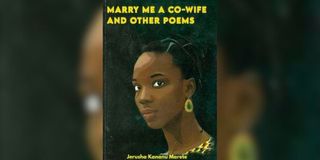Of co-wives and literature that puts bread on table

The cover of the book 'Marry me a Co-wife and Other Poems' by Jerusha Kananu Marete.
What you need to know:
- Jerusha Kananu Marete launched her book jointly with her 14-year old son, Emmanuel Marete.
- The teenager has also written his own verse collection, titled From Dawn to Dust.
I was dawdling in the musky groves of Matokeland when I heard that my Mjomba (cousin sister) from the lofty slopes of Meruland was launching her book of poems. The title poem of the book Marry Me a Co-Wife, is about a woman, Chiomwambi, who asks her husband to do her that dubious “favour”.
Nor was that all the news (isitoshe). My Mjomba, Mwalimu Jerusha Kananu Marete, was launching her book jointly with her 14-year old son, Emmanuel Marete, who has also written his own verse collection, titled From Dawn to Dust. Emmanuel’s pieces revolve mainly around the challenges of early teen self-awareness and self-realization. It is rather rare, is it not, for a mum to simultaneously launch books on the same platform.
So, I thought I should come and witness with my own two eyes this once in a blue moon phenomenon. I made a night flight (vol de nuit) into the City. Maybe, as you read this, I am heading to Keystone Park on Riverside Drive to enjoy the event. I will not review it, partly because reviewing is neither my docket nor my forte and partly because it is only beginning to happen anyway.
I mention it, however, because it dovetails into a crucial dialogue and debate in which we educators, parents and, indeed, the whole society are currently engaged. This is the “CBC”, the Competency-Based Curriculum that Marehemu Prof Magoha bequeathed to us. We are at a stage just now where teachers and education planners are talking about “career paths”, especially in secondary education.
Creative communication
I will be a little reticent about the technical details of this concept. Many of us are still struggling to get a sure grasp of it and we have to tread cautiously. But briefly, it appears to me that, with the noble intention of equipping our children with concrete, practical skills, we may want to orient them towards specialisations that enhance their perceived aptitudes. Thus we talk about career paths like “STEM”, Arts and Sports, and Social Sciences.
The STEM (science, technology, engineering, math) path is the most loudly emphasised these days. I have no objection to that. But what I keep insisting on is that the emphasis on the sciences should not lead to the downgrading and neglect of the other career paths. The arts (languages, communication, literature, visual and performing arts and sports), and the social sciences (theology, history, politics, administration, gender studies, peace and conflict resolution) careers paths are as necessary to the running and development of a viable society as any science or technology you may name.
More importantly, we should avoid the temptation of “funneling” or channeling our children too quickly and too abruptly down those career paths. A properly educated person should have an adequate and confident awareness and understanding of every aspect of life and society. A “specialist” who is literate in only his or her own career path is a dangerous animal.
“The boy must have an eddication,” says Mr Tulliver, the father of a young man in George Orwell’s Mill on the Floss. This, to me, suggests that every child deserves a broad-based and competent grasp of the world and society before being slotted into narrow specialisation. Maybe this is what Mwalimu Kananu is doing for her son by exposing him to creative communication, regardless of what career path he might take.
Poets and creative artists
One of the loudest claims by those who want to defame, discredit and downgrade the arts is that they do not generate income or create jobs. “Literature does not put food on the table,” the mockers say. This is a vicious lie on at least three counts. The first is that the material profitability of any careers, including creative ones, depends on how they are practised.
Secondly, careers, including literature, drama and sports, can and do “put food on the table”. Who is richer and more famous in Kenya, for example, than Lupita Amondi Nyong’o? Maybe Barack and Michelle Obama. A few years ago, my lineage relative, Jennifer Makumbi, a novelist, won one of the prestigious Windham Campbell prizes at Yale University. That came with $165,000. If that isn’t food on the table, I don’t know what is.
As for sports, did you hear last week that an endearing African-American young woman, Coco Gauffe, took home $2.9 million (two point nine million dollars) for winning a tennis tournament, the French Open, in Paris last week? I will not mention Faith Kipyegon lest I be accused of having too much faith in my home girl.
In any case, there are more important things in life than putting food on the table. Thieves, murderers, prostitutes, internet scammers and corrupt, unethical politicians put food on the table. Are they more relevant than the creative writer or the sincere theologian who is trying to talk some “Ubuntu” into them?
Here is my salute to the poets and all the creative artists who keep putting the spiritual and human nourishment on our tables.
Prof Bukenya is a leading East African scholar of English and literature. [email protected]


